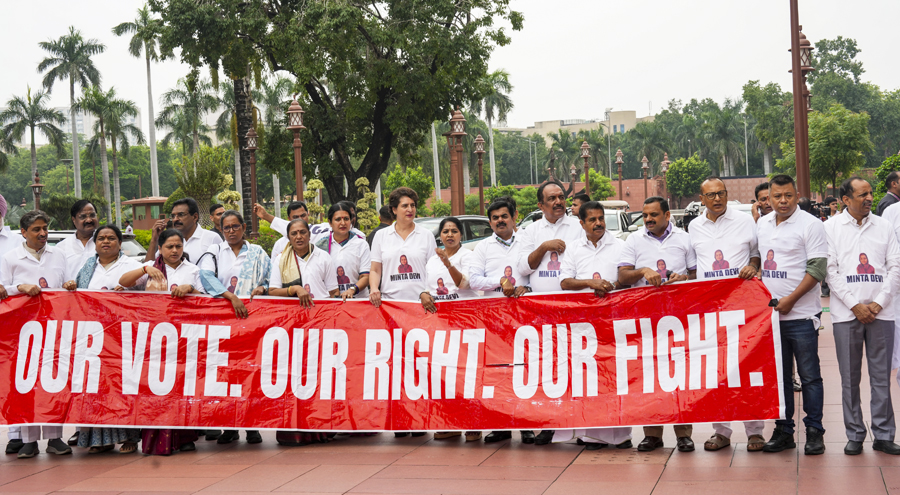THURSDAY, AUGUST 14, 2025
- Home
- Bihar SIR row: SC asks EC to publish details of 65 lakh deleted voters with reasons
Bihar SIR row: SC asks EC to publish details of 65 lakh deleted voters with reasons
The Supreme Court on Thursday directed the Election Commission of India (ECI) to publish details of 65 lakh deleted names from the voters list with reasons in Bihar's SIR of electoral roll
Published on Aug 14, 2025
By PTI
Share

NEW DELHI — The Supreme Court on Thursday directed the Election Commission of India (ECI) to publish details of 65 lakh deleted names from the voters list with reasons of non-inclusion to enhance transparency in Bihar's special intensive revision (SIR) of electoral roll.
A bench of Justices Surya Kant and Joymalya Bagchi passed the order while hearing pleas challenging the June 24 ECI decision to conduct the SIR of electoral roll in Bihar.
The list comprising names of those who have died, migrated or moved to other constituencies was directed to be displayed along with reasons at the panchayat level office and the office of district level returning officers.
The bench further stressed on giving wide publicity via newspapers including vernacular and English dailies aside from television news channels and radio to the public informing the people about the places where the list would be available.
Also read: Bihar SIR row: Not mandated to share separate list of omitted voters, ECI tells SC
The top court further allowed people aggrieved by the deletion of their names to approach the poll officials along with their Aadhaar card.
The bench while posting the matter for August 22, asked the poll panel to file a compliance report of its direction.
On August 1, the reasons cited by the EC for non-inclusion of previously registered voters in the draft rolls included death (22.34 lakh), "permanently shifted/absent" (36.28 lakh) and "already enrolled (at more than one places)" (7.01 lakh).
Senior advocate Rakesh Dwivedi, appearing for the poll panel, said it had enough reservoir of power to take certain decisions but lamented ECI functioning in an "atmosphere of sharp political hostility" where most of its decisions were contested.
He said the ECI was currently "caught between the struggle of political parties" which saw them call EVMs "bad" when they lost and call EVMs "good" when they won.
Dwivedi said a conservative estimate showed around 6.5 crore people were not required to submit any documents for SIR in Bihar as they or their parents were registered in the 2003 electoral roll.
Earlier during the hearing, the top court sought to know the documents that were considered during the 2003 intensive electoral roll revision in Bihar.
The bench said, "We would like ECI to state what documents were taken in the 2003 exercise".
The remarks came after advocate Nizam Pasha, appearing for one of the parties, referred to the court reportedly saying "if the date of January 1, 2003 (the date of earlier SIR) goes then everything goes".
"I must submit that nothing was there to show why this date is there… The impression sought to be conveyed is that it is the earlier date when the intensive exercise for revision of the electoral roll was held. It is stated that the EPIC (voter) card issued then is more reliable than issued during summary exercises conducted from time to time, is incorrect," Pasha said.
ECI conducts summary revision of electoral rolls ahead of elections for inclusion and deletion of voters every year whereas intensive revision are conducted for a thorough revision of electoral rolls in a state after a period of time.
Pasha asked if the process of enrolling under intensive and summary revisions was the same then how could EPIC cards issued under summary exercises be discarded.
The lawyer, therefore, said the date of 2003 was invalid and not based on “intelligible differentia” (basis of distinguishing the two situations).
"No receipt of my enumeration form is being given or any documents acknowledging the receipt is given and therefore the booth level officers have an upper hand and these lower level officers have too much discretion on whether the form has to be taken or not," he said.
Senior advocate Shoeb Alam, appearing for another petitioner, pointed out insufficient reasons in the ECI notification saying the process invented was neither "summary" nor "intensive" but just a creation of the notification.
"This is a process of voter registration and cannot be a process of disqualification. This is a process to welcome and not turn this into a process to unwelcome," he said.
The top court on August 13 observed electoral rolls cannot remain "static" and there is bound to be a revision, the top court said the expanded list of acceptable documents of identity from seven to 11 for Bihar's SIR of voters’ list was in fact "voter-friendly and not exclusionary."
As the row over the SIR escalated, the bench said the EC possessed residual power to conduct such an exercise as it deemed fit.
The bench also disagreed with a submission by a petitioner that the SIR of electoral rolls in poll-bound Bihar had no basis in law and ought to be quashed.
Leaders of opposition parties including the Rashtriya Janata Dal (RJD) and the Congress and the NGO Association of Democratic Reforms (ADR) have challenged the electoral roll revision drive in Bihar.

